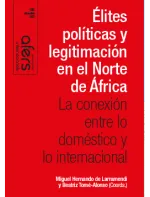Political elites and regional powers in the conflict in Libya

Alfonso Casani, profesor Ayudante Doctor, Departamento de ciencia política y de la administración, Universidad Complutense de Madrid. acasani@ucm.es. ORCID: https://orcid.org/0000-0002-9182-0180
Beatriz Mesa, profesora asociada, Le Collège des Humanités, Sciences Politiques, Juridiques et Sociales de l'Université Internationale de Rabat, Beatriz.mesa@uir.ac.ma. ORCID: https://orcid.org/0000-0003-2733-8768
More than a decade since the outbreak of the revolution in 2011, Libya remains mired in a political crisis and institutionally fragmented, having been the scene of two civil wars. This paper looks at the interrelationship between the national and international dimensions of the conflict to illustrate how the various rival political elites project an image of the country to the outside world (branding) in order to boost their national and international legitimacy, obtain material support and strengthen their bargaining position in the peace processes. To that end, it studies the discourses of the Libyan political elites in three periods: the first Libyan civil war (2011) and the transition phase, the second civil war (2014-2020) and the failed attempt to hold presidential elections in 2021.
Key words: Libya, political elites, branding, international interference, civil war
How to cite this article: Casani, Alfonso y Mesa, Beatriz. «Élites políticas y potencias regionales en el conflicto en Libia». Revista CIDOB d’Afers Internacionals, n.º 135 (diciembre de 2023), p. 169-191. DOI: doi.org/10.24241/rcai.2023.135.3.169
Revista CIDOB d’Afers Internacionals, nº 135, p. 169-191
Quadrimestral (October-December 2023)
ISSN:1133-6595 | E-ISSN:2013-035X
DOI: doi.org/10.24241/rcai.2023.135.3.169
Reception date: 29.03.23 ; Acceptance date: 01.09.23
>> The full text articles are available in Spanish language